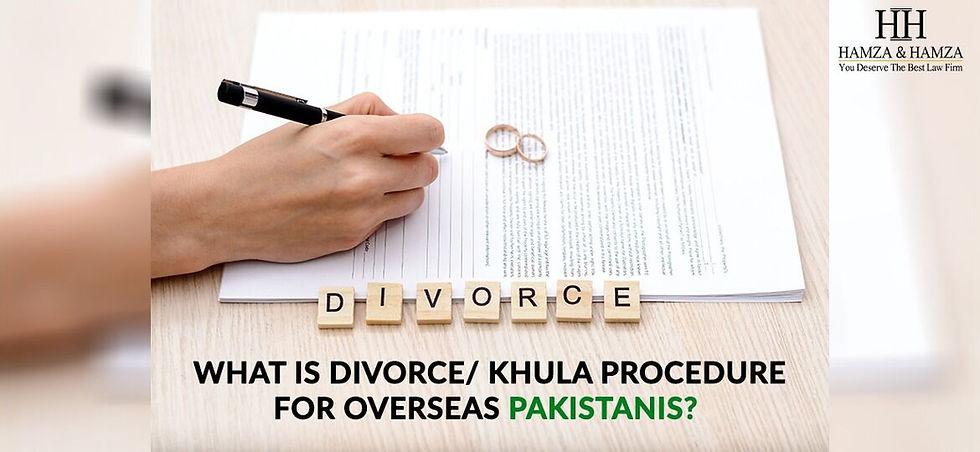What Are The Islamic Legal Grounds For Khula Procedure In Pakistan?
- Hamza and Hamza
- May 14, 2025
- 3 min read
In Islamic jurisprudence, Khula refers to the right of a Muslim woman to seek divorce from her husband by returning her dower (mehr) or compensation. Khula Procedure In Pakistan is rooted in Islamic principles that emphasize justice, fairness, and the protection of human dignity within marriage. In Pakistan, the Khula procedure is legally recognized and practiced through the Family Courts under Islamic law, particularly for Muslim women. The Islamic legal grounds for Khula form the moral and judicial basis upon which courts determine whether a woman is entitled to a judicial divorce.
Islamic Concept of Marriage and Divorce
In Islam, marriage (nikah) is a civil contract between a man and a woman, not a sacrament. While it is highly recommended and regarded as a foundation of society, Islam also recognizes that a marriage may fail. Hence, both men and women are granted the right to dissolve a marriage under certain circumstances. While men can pronounce talaq (divorce), women are provided with the option of Khula if they cannot continue in the marriage for valid reasons.
Quranic Basis of Khula
The Quran provides a foundation for Khula in Surah Al-Baqarah (2:229):
“If you fear that they cannot keep the limits of Allah, then there is no blame on either of them if she gives something for her release.”
This verse acknowledges that if a woman feels she cannot live with her husband within the bounds set by Allah, she may seek a separation by offering compensation, often in the form of returning the mehr. This principle underlies the entire concept of Khula in Islamic law.
Hadith Supporting Khula
A well-known hadith further supports Khula, reported in Sahih Bukhari:
"The wife of Thabit ibn Qais came to the Prophet (PBUH) and said: ‘O Messenger of Allah, I do not blame Thabit for any defects in his character or religion, but I cannot continue living with him.’ The Prophet (PBUH) asked her to return the garden (mehr) and granted her Khula."
This Hadith forms a precedent, indicating that a woman does not necessarily have to prove abuse or cruelty; her genuine inability to live with her husband is sufficient ground for seeking Khula.
Islamic Legal Grounds for Khula in Practice
The Islamic legal grounds for Khula, as interpreted and practiced in Pakistan, include:
Incompatibility or Loss of Affection: If a woman no longer loves or is emotionally connected to her husband and finds it impossible to fulfill her marital duties, she may seek Khula. Emotional estrangement is a valid Islamic ground.
Cruelty or Abuse: Physical or mental abuse, constant conflict, or threats to the woman’s dignity and safety justify her right to seek Khula under Khula Procedure In Pakistan.
Neglect and Desertion: If the husband fails to fulfill his responsibilities — such as providing financial support, affection, or companionship — Khula may be justified.
Forced Marriage: If a woman was coerced into marriage against her will, she may seek Khula once she gains the capacity to make her own decisions.
Fear of Failing the Limits of Allah: This is the broadest and most fundamental ground. If the woman sincerely believes she cannot maintain the marriage in accordance with Islamic teachings and risks violating Allah’s limits, she is permitted to seek Khula.
Role of Pakistani Courts
Pakistani courts consider these Islamic grounds when assessing a woman’s petition for Khula. The Family Courts Act 1964 facilitates this process. If reconciliation fails, and the woman convinces the court that continuation of the marriage is not possible, the court grants Khula based on Islamic grounds.
Hamza & Hamza Law Associates often do not demand strict evidence of cruelty or abuse. Instead, they assess whether the woman’s claim of incompatibility or her inability to live with the husband is sincere. This interpretation aligns with the broader, compassionate approach of Islamic law.
Conclusion
The Islamic legal grounds for Khula in Pakistan reflect the spirit of fairness and mercy in Islamic family law. Rooted in the Quran and Hadith, Khula is a woman’s right to end a marriage when the marital bond becomes a burden. Pakistani courts, guided by Islamic teachings, ensure that women can exercise this right with dignity and legal protection.








Comments